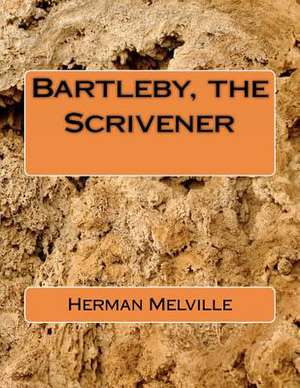Bartleby, the Scrivener
Autor Herman Melvilleen Limba Engleză Paperback – vârsta de la 14 până la 18 ani
| Toate formatele și edițiile | Preț | Express |
|---|---|---|
| Paperback (26) | 26.12 lei 22-36 zile | +2.90 lei 5-11 zile |
| Mint Editions – 31 dec 2020 | 26.12 lei 22-36 zile | +2.90 lei 5-11 zile |
| CreateSpace Independent Publishing Platform – | 36.47 lei 22-36 zile | |
| CreateSpace Independent Publishing Platform – | 37.59 lei 22-36 zile | |
| CreateSpace Independent Publishing Platform – | 37.98 lei 22-36 zile | |
| – | 39.84 lei 22-36 zile | |
| – | 44.13 lei 22-36 zile | |
| CreateSpace Independent Publishing Platform – | 45.12 lei 22-36 zile | |
| CreateSpace Independent Publishing Platform – | 45.18 lei 22-36 zile | |
| – | 45.41 lei 22-36 zile | |
| CreateSpace Independent Publishing Platform – | 45.41 lei 22-36 zile | |
| CreateSpace Independent Publishing Platform – | 46.00 lei 22-36 zile | |
| – | 48.60 lei 22-36 zile | |
| CreateSpace Independent Publishing Platform – | 50.46 lei 22-36 zile | |
| CreateSpace Independent Publishing Platform – | 50.70 lei 22-36 zile | |
| CREATESPACE – | 51.05 lei 22-36 zile | |
| CreateSpace Independent Publishing Platform – | 51.28 lei 22-36 zile | |
| CreateSpace Independent Publishing Platform – | 51.69 lei 22-36 zile | |
| – | 55.20 lei 22-36 zile | |
| – | 66.17 lei 22-36 zile | |
| CreateSpace Independent Publishing Platform – 16 dec 2015 | 47.71 lei 43-57 zile | |
| – | 49.04 lei 43-57 zile | |
| Lulu.Com – 26 aug 2018 | 49.98 lei 43-57 zile | |
| – | 52.65 lei 43-57 zile | |
| – | 58.04 lei 43-57 zile | |
| Binker North – 31 oct 1853 | 62.46 lei 43-57 zile | |
| – | 91.73 lei 43-57 zile | |
| Hardback (3) | 91.06 lei 17-23 zile | +7.89 lei 5-11 zile |
| Insel Verlag GmbH – 8 mar 2020 | 91.06 lei 17-23 zile | +7.89 lei 5-11 zile |
| Binker North – noi 1853 | 122.28 lei 43-57 zile | |
| Lulu.Com – 26 aug 2018 | 150.95 lei 43-57 zile | +16.44 lei 5-11 zile |
Preț: 51.05 lei
Nou
Puncte Express: 77
Preț estimativ în valută:
9.77€ • 10.23$ • 8.08£
9.77€ • 10.23$ • 8.08£
Carte disponibilă
Livrare economică 17-31 martie
Preluare comenzi: 021 569.72.76
Specificații
ISBN-13: 9781461066897
ISBN-10: 1461066891
Pagini: 26
Dimensiuni: 216 x 279 x 1 mm
Greutate: 0.09 kg
Editura: CREATESPACE
ISBN-10: 1461066891
Pagini: 26
Dimensiuni: 216 x 279 x 1 mm
Greutate: 0.09 kg
Editura: CREATESPACE
Notă biografică
Herman Melville (born Melvill;[a] August 1, 1819 - September 28, 1891) was an American novelist, short story writer and poet of the American Renaissance period. Among his best-known works are Moby-Dick (1851), Typee (1846), a romanticized account of his experiences in Polynesia, and Billy Budd, Sailor, a posthumously published novella. Although his works were not widely appreciated at the time of his death, the centennial of his birth in 1919 was the starting point of a Melville revival in which critics re-evaluated his work and his novels became recognized as world classics.
Melville was born in New York City, the third child of a prosperous merchant. His formal education ended abruptly after the death of his father in 1832 left the family in financial straits. He took to sea in 1839 as a common sailor on a merchant ship and then on the whaler Acushnet but jumped ship in the Marquesas Islands. Typee, his first book and its sequel, Omoo (1847) were travel-adventures based on his experiences there. Their success gave him the financial security to marry Elizabeth "Lizzie" Shaw, a daughter of a prominent Boston family. His first book not based on his own experience, Mardi (1849), was not well received. His novels Redburn (1849) and White Jacket (1850) were given better reviews but did not provide financial security.
Moby-Dick (1851), although now considered one of the great American novels, was not well received by contemporary critics. His psychological novel, Pierre: or, The Ambiguities (1852) was also scorned by reviewers. From 1853 to 1856, Melville published short fiction in magazines, which was collected in 1856 as The Piazza Tales. In 1857, he traveled to England and then toured the Near East, and that same year published his last work of prose, The Confidence-Man (1857). He moved to New York in 1863 to take a position as Customs Inspector. From that point, he focused his creative powers on poetry. Battle-Pieces and Aspects of the War (1866) was his poetic reflection on the moral questions of the American Civil War. In an emotionally jarring incident, in 1867, his eldest child Malcolm died at home from a self-inflicted gunshot.
Melville's metaphysical epic Clarel: A Poem and Pilgrimage in the Holy Land was published in 1876. In 1886, his other son Stanwix died of apparent tuberculosis, and Melville retired. During his last years, he privately published two volumes of poetry, left one volume unpublished, and returned to prose of the sea. The novella Billy Budd was left unfinished at his death but was published posthumously in 1924. Melville died from cardiovascular disease in 1891.
